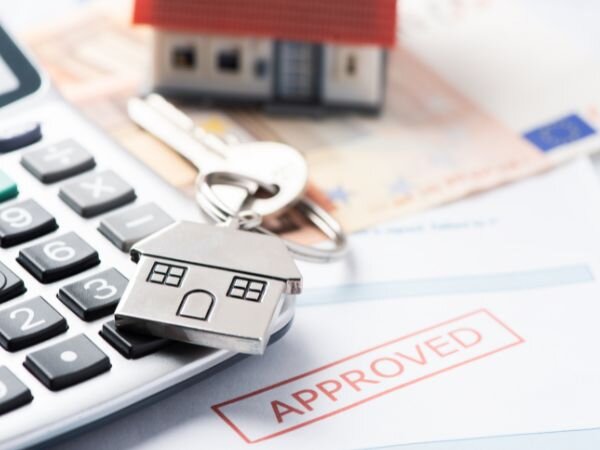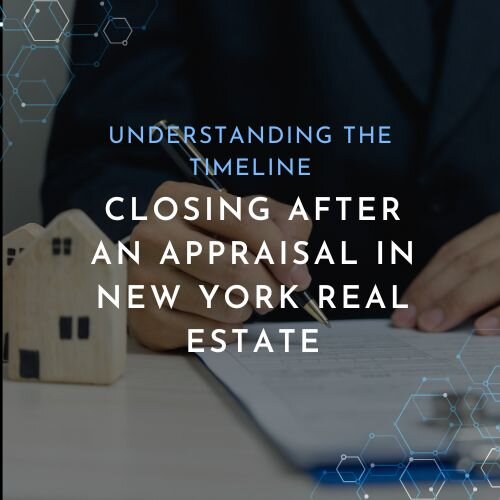How Long After an Appraisal Can You Close in New York? NYC Home Closing Timeline

The appraisal is a very important step in buying or selling real estate in New York City. After an assessment, buyers and sellers need to know how much time they have to close so they can make good plans and set reasonable goals. This article tells you when most home closings in New York City occurs and what kinds of delays could happen after an appraisal. These timeframes can help you make smart decisions and speed up the process, whether you’re buying your first home or are a seasoned investor.
Brief Overview
People who want to buy a property in New York have to do a lot of things, such getting an appraisal that tells them how much the house is worth and when it will close. After the evaluation, both buyers and sellers need to be honest with themselves and be ready for delays. Getting mortgage approval based on the appraisal results, communicating to lenders and agents, and selecting a fair closing date are all very important. If you learn about the process from evaluation to walkthrough through workshops and online tools, the purchase will go smoothly. You need to plan carefully and talk to each other well in New York’s fast-paced market to make sure the closing happens well and on schedule.
Key Highlights
- The value of a property is decided by appraisals, which could change before the deal closes. Staying on time is really important.
- Getting a mortgage accepted after an inspection is quite important, and this usually means that the lender has to do a lot of evaluations.
- If you work with lenders and brokers, you can be confident that the closing will place on schedule and with the right paperwork.
- Stay in touch to find out if there are any problems with the title or inspection.
- You can learn how to buy wisely by going to real estate forums and taking housing classes.
Understanding the Appraisal Process in New York
If you know how to do an evaluation, it can help you buy a house in New York’s fast-paced real estate market. An appraisal tells you how much a property is worth, which is what dictates when it may be sold. Knowing this helps you avoid delays, which makes it easier to buy a house. Buyers can easily get through the hard closing process if they know how appraisals fit into the selling of a home in Brooklyn or anywhere in New York. This article shows how important it is to get an appraisal when you buy a house.
The Role of Appraisals in Home Buying

Getting an appraisal before you buy a house is a wonderful approach to make sure the price is fair. An independent appraisal finds out how much a home is worth on the market, which protects both buyers and lenders. This section of the assessment is very important in New York because the market determines how much homes are worth. When the property is being looked at, the appraiser looks at its location, condition, and the prices of similar homes that have sold in the area. This assessment makes sure that the property is worth the loan amount, which protects both the buyer and the lender.
A good appraisal protects the lender’s money by making sure that the loan amount is less than the home’s value. After a loan is given, lenders often ask for appraisals. This is a very important element of the process of buying a property. Appraisals could change how much you can borrow, how much interest you pay, and how much insurance you need. The difference between the property’s appraised value and sale price can make a buyer say yes or no. You might have to change the terms of the loan or the price in the negotiation. Buyers who know how this works will always be ready, which makes the deal go smoothly.
How Appraisals Impact the Closing Timeline
You can’t say enough about how judgments alter when things close. People in New York are always following real estate deals, so the time and results of an appraisal could change the date of a sale. If the appraisal results are the same as or greater than the agreed-upon purchase price, the mortgage approval process usually continues. Closing could take longer if there are problems that come up, such disagreements about the property’s value or the lender’s requirements.
It’s highly important that the appraiser and the lender get along. Lenders look at assessment reports to make sure they follow the rules for the money and the market. This screening process could find problems like repairs that need to be made or differences in value that purchasers need to fix before they can move on. Secondary evaluations or talks about how much repairs will cost or how much prices will change could make things take longer.
Buyers should talk to their lenders and real estate professionals often so that they may fix problems quickly. Being proactive keeps things moving and prevents delays, which makes the closing go more smoothly. Buyers can set realistic closing dates when they know what could go wrong throughout the appraisal process. This is really important in a market like New York that moves quickly. So, fixing these tough problems speeds things up and helps purchasers make smart choices about how to spend their money.
From Appraisal to Closing: Key Steps in the Journey
It could be hard to get from assessment to close in New York City’s busy real estate market. It can be easier to close on a house if you know what to do, such having a mortgage approved after an appraisal and talking to the right individuals. The next step after getting an appraisal and a value for the property is to work with lenders and brokers to finish the deal. This part talks about important events and trades that have happened during this time so that you are ready for each step up to the closing appointment.
Securing Mortgage Approval After Appraisal
Getting a mortgage is very important after the property has been appraised. The appraisal will let you know if you can get a mortgage. This is how lenders in New York figure out how dangerous a loan is: they look at how much the property is worth. A good evaluation is advantageous for both the buyer and the lender. A correct appraisal makes sure that the property’s market value is high enough to cover the loan, which makes it safer. Lenders will carefully analyze the appraisal report and the buyer’s financial information to figure out the terms of the mortgage. During this time, the buyer and lender need to converse to each other. The lender needs to check if the loan amount is the same as the appraised value and that the borrower can afford the mortgage. Lenders want to see up-to-date financial statements, proof of assets, and other papers. This could make the approval process take longer. During the approval process, buyers should be ready to answer questions. If the appraisal doesn’t meet the buyer’s or seller’s expectations, they may need to talk about how much the property is worth. Getting a loan commitment is the last step in getting a mortgage. This important phase brings the procedure to an end. If complications come up at this point, buyers need to respond quickly so that closing doesn’t get pushed back. Being proactive, organized, and aware of concerns might make it easier to own a property. It’s crucial to know every step of the mortgage approval process so that the closing goes smoothly.
| Step | Key Activities | Stakeholders Involved | Potential Challenges | Outcome |
| Appraisal | Property valuation | Appraiser, Seller | Market fluctuations | Accurate property value |
| Offer and Negotiation | Submitting and discussing offers | Buyer, Seller, Real Estate Agents | Disagreement on price | Mutually accepted terms |
| Inspection | Property examination | Inspector, Buyer, Seller | Hidden defects found | Inspection report |
| Financing | Mortgage approval process | Buyer, Lender | Credit issues | Secured financing |
| Closing | Finalizing all legal documents | Buyer, Seller, Attorneys | Last-minute issues | Transfer of ownership |
This table highlights the essential stages and relationships crucial to understanding the journey from appraisal to closing within the real estate market of New York City.
Coordinating with Lenders and Professionals
After you get your mortgage, you should work with real estate experts and lenders. For instance, this cooperation is needed to set up the closure. In New York’s fast-paced economy, timing is highly important. Everyone needs to agree. The lender and the real estate company check the title searches and insurance confirmations. This means that you should read the mortgage carefully and observe all of its rules before you close on it. experts help people talk to each other and make sure they get things done on time. Their advice clears up any confusion and makes it easy to deal with unanticipated legal problems or title concerns. Agents keep everyone up to date, which helps things move forward. There are no breaks during the whole process. Lenders should keep buyers up to date on the terms of the loan and any other checks that need to be done. As the closing date gets closer, the buyer makes plans for final walkthroughs to make sure the property is in the condition that was agreed upon. It’s very important to be open-minded and flexible right now. There can be delays if there are problems during inspections or if the negotiations over the final specifications have to start afresh. Buyers can still quickly fix problems by talking to their lenders and brokers. This makes things move more smoothly and makes sure the closing happens on time. If you are proactive and talk to individuals, the closing process will go more smoothly. This can help you move into your new house in New York real estate on time and without any issues.
When you choose to sell to a cash home buyer, the process becomes much more streamlined compared to traditional sales involving agents and lenders. Since there’s no mortgage approval or financing delays, the entire transaction moves faster and with fewer complications. Cash buyers typically handle most of the paperwork, title verification, and closing arrangements directly. By working directly with Prestige Home Buyers, homeowners can avoid unnecessary delays, reduce stress, and move forward confidently toward their next step in life.
Setting a Realistic Closing Date for Your Home
You need to know a lot of things and plan ahead to schedule a closing date for a house. It’s simpler to move around in New York’s competitive real estate market when appraisers and lenders are on the same page. To implement this method, you need to know what happens on closure day and how to deal with delays that could cause complications. Setting realistic goals might help homeowners get things done faster and make fewer mistakes. This makes it easier to own a home.
What to Expect on the Closing Day

Closing day is the second-to-last step in buying a house, and it comprises a lot of important things. Usually, the closing date is set a few weeks after the mortgage is approved. It needs a lot of work in the areas of legislation and money. This is the day that buyers sign the papers to finish the agreement and obtain the title to the house. You have to sign a lot of papers at closing, such as the deed, the mortgage agreement, and the closing disclosure. Each piece of paperwork has a specific function to do to make sure the estate transfer goes well. Banks and other lenders look into the details of mortgages. People who want to buy a house should know how important it is to do a last walkthrough, which is generally before closing. This step makes sure that the house is in the condition that was agreed upon and that any repairs were done correctly. You also need cash or a certified check to pay for the last down payment and the closing charges. Most people anticipate the closing will go well, but if there are flaws on the paperwork or difficulties that haven’t been fixed yet, it could take longer. It will be easier to go through this if you work with New York real estate company and lawyers that are familiar with the laws. They make sure that everyone is happy with the deal and that all the paperwork is in place. Plan ahead and make sure all the paperwork is in order so that the transfer of house ownership happens smoothly. Make sure to plan your closing day well. The talks are over, and now you may start your new life as a homeowner.
Potential Delays and Their Causes
You can make a smooth closing timeline if you know about possible delays. That will help you buy a house in New York. If there are problems with the inspection, changes in your finances, or mistakes in your mortgage paperwork, the process could take longer. Title searches usually disclose unpaid debts or liens, which can make things take longer. Before the deal can go through, they need to be corrected. The title needs to be clear because problems that aren’t fixed can make things take longer. If the borrower doesn’t meet all of the lender’s requirements, it could be hard to complete the mortgage. Lenders look closely at the buyer’s and the property’s finances. They can need extra documentation of assets or evaluations, which makes the closure take longer. Changes in the market or the buyer’s finances may mean that the financing arrangements need to be looked at again, which could delay the sale. To avoid these problems, buyers should talk to lenders and brokers on a frequent basis. Real estate agents can help you get through these problems by getting ready ahead of time and not allowing things get behind. It’s very important to help people change their opinions or talk about their problems and make sure that checks are done on time. Sellers who don’t follow the rules for repairs or transfers could also cause delays because it takes longer to reach an agreement. The New York real estate market is tough, but if you plan ahead and think about five items, you can make closing day go more smoothly and cut down on delays.
Practical Tips for a Smooth Home Closing
You need to prepare ahead and pay attention to the details if you want to buy a house in New York. These tips can help you finish on time and find new resources. You need to move quickly through this step, otherwise the transfer might not go through. To use this strategy, you need to understand how lenders and agents work together. Be ready for each level.
Staying on Your Closing Timeline

Meeting your deadlines is very crucial in the fast-paced world of New York real estate. It’s important to talk to your lender often to make sure that the loan process is going as planned based on the results of the examination. This proactive strategy takes care of problems and worries right away, which keeps everything running smoothly. Apps for real estate transactions help you remember meetings and deadlines as they happen. This tech-savvy plan makes it easy to talk to buyers, lenders, and real estate agents and fill out documents.
Keep your financial records up to date and easy to find. The lender might check your pay stubs, tax returns, and asset statements before giving you the loan. If you get these papers ready ahead of time and talk to your lender, you can prevent last-minute surprises that could push back your closing. Write down important dates, such when your house loan is approved and when it closes. You can use charts or calendars to keep track of this. If you cooperate with the lender and agent, you might be able to reach your closing date and make it easier to acquire a property. These ideas can help you meet your closing date:
- Make sure everyone is on track by setting clear goals and checking in every now and then.
- Let everyone know when things are due so they know what to do.
- Project management software makes it easier to get things done and work collaboratively.
- Take the time and money you need to deal with any delays that come up.
- Check the timeframe every now and again to make sure it’s still fair.
- Get people to fix situations before they get worse.
- Talk about how things are going and what you plan to do next on a regular basis.
To cut down on confusion and boost productivity, make sure everyone knows what their role is. Follow these smart strategies to keep things going and meet your deadlines.
Additional Resources for Homebuyers in New York
There are many ways to help people sell homes in New York. People that go to local housing workshops and seminars can learn a lot about New York’s real estate market. There are a lot of different things that these workshops cover, such as online tools for analyzing property and programs that help with money. This helps those who are buying homes make better choices. A lot of seminars teach first-time buyers how to close quickly and efficiently and give them incentives to do so. These workshops could help you stand out in this crowded field.
Real estate websites and forums may have useful information for purchasers in New York. You can use these sites to find a lender, learn about your financing alternatives, and identify trustworthy real estate agents. The New York State Department of Financial Services and other similar sites offer advice and information on how to be safe when buying or selling a home. These tools could help you avoid problems and make the process of buying a home go more smoothly.
In the end, the most important thing in the New York real estate market, which is continually changing, is to be patient and ready.
Helpful New York Blogs


